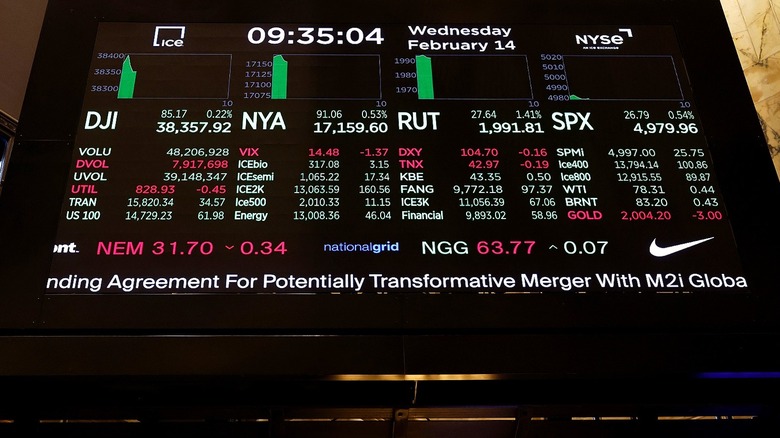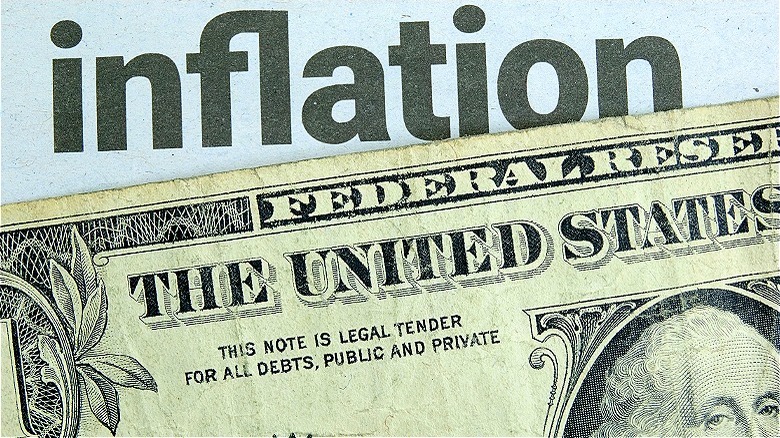What Actually Controls The Price Of Stocks?
The stock market is more relevant than ever before as Americans increasingly become involved in the market. According to the Federal Reserve's triennial Survey of Consumer Finances, in 2022, a whopping 58% of American households owned stock (either directly or indirectly). This was not only the highest rate on record, but was also higher than previous records seen right before the dot-com boom of the late-1990s and the 2007 to 2008 financial crisis. This means that more families have a vested financial interest in stock prices than at any other time in the country's history. It also means they have a lot of questions when it comes to how stock prices work. For example, what actually controls them?
Perhaps the most important thing to know about stock prices is that they are ultimately affected by the laws of supply and demand. As William Haight, a director at Capital Choice Financial Group, explained to Time, "The price of a stock is determined by how many people want the stock and how much of it there is. If more people want to buy a stock, then the price will go up. But if more people want to sell, then the price will go down." Now, while this might seem like a simple enough rule, it's important to realize that numerous factors can ultimately change both the supply and demand factors for stocks. These can, and do, affect stock prices. Let's dive into some of the factors that are most likely to affect stock prices.
The broader economy
There are a few specific elements of the broader economy that can prove especially important for stock prices. These can also serve as indicators for the overall stock market (for instance, whether or not the market is experiencing a bubble or heading for a recession, etc.). For starters, inflation can have a significant impact on both consumers and companies. By effectively raising the prices of goods and services, inflation reduces buying power, which can lead to other problems.
For businesses, meanwhile, high inflation can spook investors into selling off stock. Even worse, it can lead to a company reporting poor overall financial performance since the cost of doing business inevitably increases alongside the price of goods and services. As expenses increase, profits can take a hit, which can further spook investors into potentially selling off shares. This has the potential to create an overall decline in a company's stock price, which can even affect its larger industry.
Similarly, interest rates can also affect stock prices, as high interest rates can lead to an increase in corporate borrowing expenses. Much like inflation, this increase in expenses can negatively impact profitability, which can create a ripple effect for stock prices. Also related to inflation and interest rates is consumer spending. Since many companies are publicly traded, sales reports and earnings can have a significant impact on stock prices. This means that as people purchase less (especially if they are experiencing a loss of buying power), the less a company earns, which can lead to a decline in share prices. (Check out some of the best tips for investing in stock as a beginner.)
Events both big and small
Specific, punctuated events can also cause ripples for the stock market. From natural disasters affecting stock market performance to wars and geopolitical conflicts, large-scale news events have the ability to change stock prices, either within specific industries or across the entire market, depending on their influence and the involved players.
According to the research paper "Geopolitical risks, uncertainty, and stock market performance," published in the journal Economic and Political Studies (Volume 10, Issue 3), geopolitical events and risks that occurred between 1985 and 2020 — across 22 different countries — directly contributed to a decrease in stock returns. Yet, the exact rate of this decrease varied considerably (between 10.53% to 42.14%). LPL Financial research, meanwhile, noted prior geopolitical events have led to a roughly 4.7% decline in the stock index. Interestingly, it took an average of 19 days post-event to reach the market bottom, and an average of 42 days to recover associated losses.
Smaller-scale company or industry driven events, meanwhile, can similarly affect company stock prices. This can include everything from the rollout of a new product to the acquisition of another company to the death of a CEO. While it might seem like an individual company's decisions and/or happenings would serve to hurt or help only itself, you might be surprised to learn that research has found the opposite. In fact, the concept of "guilt by association" is a significant factor when looking at an industry's outlook (and stock prices). Negative press or attention on one company within an industry can serve to bring down demand for an entire industry or sector.


